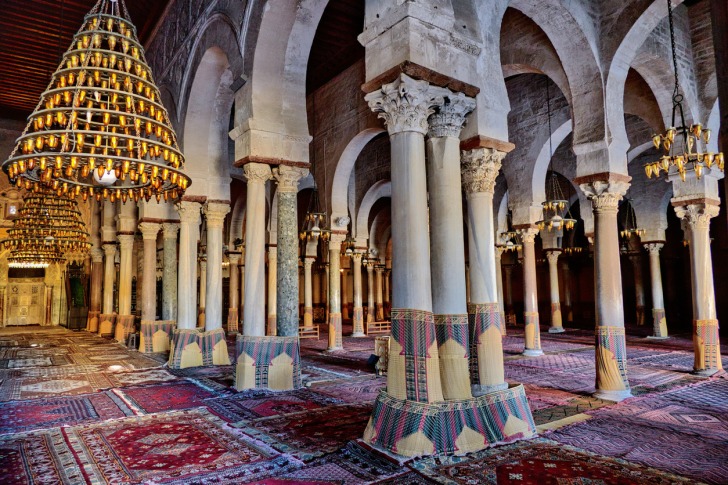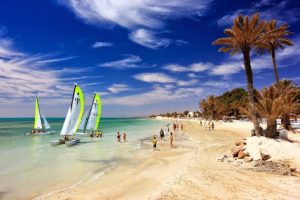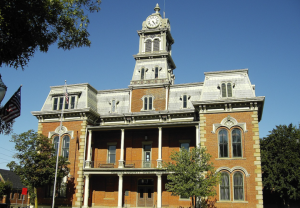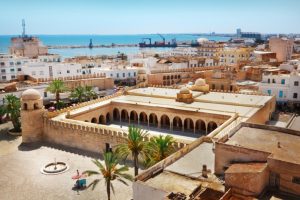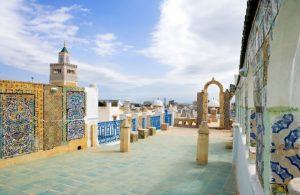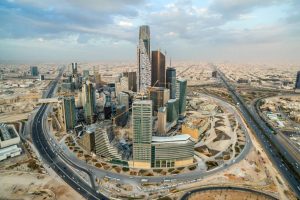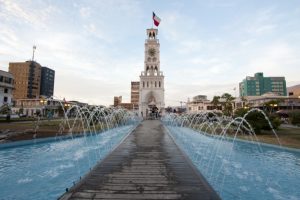 Tunisia : Safety by City
Tunisia : Safety by City
Tunisia - safety as a country Kairouan Medina, Tunisia is a unique tourist destination.
The tourism industry in Tunisia decreased drastically in 2015.
Today, tourism is returning, but many people still wonder if Kairouan Medina is a safe place to visit.
Warnings & Dangers in Kairouan Medina

OVERALL RISK: MEDIUM
Kairouan Medina, Tunisia is a relatively safe place to visit, but there are some risks. Terrorism is a concern. Crime, particularly petty crime, also occurs. It's a very conservative Muslim city within a conservative country. When traveling here, you'll need to dress modestly. It's also important to note that Kairouan Medina is not a safe place for LGBTQ individuals. There are pride organizations in Tunisia. However, same-sex relationships are illegal. If you are a member of the LGBTQ community, you shouldn't avoid traveling to Kairouan Medina. However, you should avoid public displays of affection.

TRANSPORT & TAXIS RISK: MEDIUM
Kairouan Medina has a robust public transportation system. You can get to Kairouan Medina by bus or train. Once you are in the city, you can opt for the local bus route or taxi. The bus is the least expensive option and is relatively safe. Taxis are considered safe as well, but they are more costly. You can also choose a horse-drawn carriage, but this is much more expensive than other transportation options. There is some risk when you are on the roads in Kairouan Medina. Drivers often ignore traffic signals and even drive on the wrong side of the road. Pedestrians and riders on motorcycles or mopeds will often ignore vehicles, which also poses a danger.

PICKPOCKETS RISK: LOW
Pickpocketing does happen in Kairouan Medina, but it's not particularly common. Targeting tourists is strongly frowned upon because tourism is an important industry for the area. Many people will leave their belongings unattended when they are out in public here. This is very rare in Western countries and shows that pickpocketing doesn't occur often. Of course, it's still recommended to take some precautions to avoid pickpocketing.

NATURAL DISASTERS RISK: HIGH
Flooding is the biggest natural disaster risk in Kairouan Medina. Monsoons bring heavy rainfall which can cause flash flooding. In fact, flooding costs about $40 million in damages each year. Other natural concerns include earthquakes, extreme temperatures, drought, and fires.

MUGGING RISK: LOW
Petty crime does occur in Kairouan Medina, but more serious crimes are very rare. You can feel safe when walking around the city. Law enforcement is strict and the people are generally very friendly. However, showing disrespect for the Muslim culture can put you in danger.

TERRORISM RISK: MEDIUM
It's very unlikely that you would be the victim of a terrorist attack in Kairouan Medina. However, terrorism is the biggest safety concern here. There were several terrorist attacks in Tunisia in 2015 that targeted tourists. Since then there have been attacks in a few areas of the country, but none in Kairouan Medina. The U.S. Embassy recommends exercising increased caution when visiting Tunisia, giving it a Level 2 status.

SCAMS RISK: HIGH
Scams are a common issue in Tunisia, including Kairouan Medina. In fact, 43% of residents in Tunisia are the victims of fraud, and 15% have been scammed multiple times. Most of these are online scams that target locals, but you should be cautious. If a deal sounds too good to be true, you should assume that it is. Common scams include holding packages at customs, selling expired subscriptions, and invalid vouchers for popular brands.

WOMEN TRAVELERS RISK: MEDIUM
Women are generally safe in Kairouan Medina. It's a tourist area, so locals here are more tolerant than in some areas of the country. However, there are men in the country that believe Western women are "easy". They may catcall or even ask for a kiss. If you are a woman, it's a good idea to dress conservatively when out in public. This means avoiding items like shorts and short skirts. Kairouan Medina is relatively modern, but there are still plenty of conservative Muslims who may get offended by Western clothing, particularly if it is suggestive. You don't need to buy a new wardrobe, just dress as you would if you were meeting someone's parents for the first time or making a court appearance.

TAP WATER RISK: HIGH
Drinking tap water in Kairouan Medina isn't recommended. In some areas, the tap water may be contaminated or unsafe to drink. In most areas of Kairouan, this is not an issue, because the water has been treated properly. However, the water contains different minerals and concentrations than your body is used to. This can cause traveler's diarrhea. Bottled water is readily available, so it's best to avoid taking a risk. You can use the water to brush your teeth and rinse vegetables, but avoid drinking it.
Safest Places to Visit in Kairouan Medina
One of the most important attractions in Kairouan Medina is the Great Mosque of Kairouan.
It’s one of the largest Mosques in North Africa.
The Basins of Aghlabides is another important location.
It was designed in the 9th century to supply water to the city.
Places to Avoid in Kairouan Medina
When in Kairouan Medina, avoid the outskirts of the city, particularly after dark.
It’s also a good idea to avoid the industrial area on the East side of the city.
This area is rarely frequented by tourists, and may not be as safe as other areas.
Safety Tips for Traveling to Kairouan Medina
- Avoid Public Demonstrations. Civil unrest does occur in Kairouan Medina and other areas of Tunisia. Peaceful protests can turn violent, just as they can in the U.S. If you encounter a demonstration, it’s best to leave the area to be safe.
- Don’t Look Like a Tourist. You don’t have to pretend to be a local. However, it’s a good idea to avoid drawing unnecessary attention to yourself. Avoid flashy clothes. You should also make sure that you don’t get so distracted by the sights that you don’t ignore your surroundings.
- Leave Expensive Items at Home. You should avoid flashing valuables or large amounts of cash when in Kairouan Medina. Many people here are very poor. Criminals will target those who they see as wealthy, so displaying valuables can put a target on your back. Leave your expensive jewelry and other items at home. Not only does it make you safer, but it also gives you some peace of mind. The fewer things you have to keep track of, the more you can relax and enjoy yourself.
- Don’t Leave Valuables in Your Hotel Room. Do leave valuables, including important documents, in your hotel safe. Do not leave them lying around in the room. This poses an unnecessary temptation and a worry for you. Anything you can’t afford to lose should ideally be in the safe. If not, it should be on your person.
- Food and Drink Safety. Some sources recommend eating raw fruit only if it’s peeled and avoiding eating raw vegetables. In recent years, Tunisia has implemented new food safety laws which have made it safer for locals and tourists to eat. However, you should use common sense. If a restaurant looks unsanitary or doesn’t practice proper food storage, avoid it. As mentioned previously, it’s a good idea to avoid drinking the water in Tunisia. Cooked food can be enjoyed safely. However, you should avoid buffet-style dining if the food has been out for a long period.
- Learn French. French is the second most common language in Tunisia. Most people don’t speak English, but many speak French. It’s not necessary to become fluent in French. Even a few simple phrases can be helpful.
- Know Local Customs and Laws. When traveling to another country, abiding by their laws and customs is a sign of respect. We’ve discussed dressing modestly and avoiding same-sex interactions. When greeting someone, a handshake followed by touching your heart is considered proper. If you are a man, wait for women to offer their hand if they choose to. Avoid serving or eating food with your left hand. The left hand is considered unclean and is reserved for “toilet duties”. This is particularly important if you’re eating from a communal dish, which is common here.
- Enroll in STEP. STEP stands for Smart Traveller Enrollment Program. It’s offered free of charge by the U.S. Embassy. Enrolling makes it easy for the Embassy to contact you in an emergency, including civil unrest, natural disasters, and emergencies at home. You can also receive notifications and alerts to help you stay safe in Kairouan Medina.
- Outdoor Safety. Tunisia has its fair share of dangerous, and even deadly animals. Most of these are confined to the countryside, but some pose a danger in Kairouan Medina as well. Fat-tailed scorpions have a sting that can be fatal. Horned vipers and Egyptian cobras can also be deadly. Wild dogs can be rabid and should be avoided. However, the biggest danger may also be the smallest. Mosquitos carry several dangerous diseases, including Dengue fever. Use insect repellent and wear long-sleeved clothing to protect yourself.
- Get Vaccinated. The CDC recommends that travelers under 60 who haven’t been vaccinated for Hepatitis B get the vaccine before traveling to Tunisia. Rabies vaccination and Typhoid may be recommended as well.
So... How Safe Is Kairouan Medina Really?
Tunisia has a bit of a bad reputation since the 2015 terrorist attacks.
However, Kairouan Medina, Tunisia is a safe place to visit, as long as you take some basic precautions.
If you are an LGBTQ person, avoid public displays of affection.
If you are a woman, be sure to dress modestly.
Scams and pickpocketing can occur, so keep your wits about you.
Overall, the crime rate is low here, so you can relax and enjoy your stay as long as you follow the safety tips listed above.
Overall, the city is safer than the majority of Western cities.
It’s also one of the most tolerant Arab nations.
You are free to practice any religion you choose, and you can even find a synagogue here.
While it is advised to dress conservatively, the people here are much more liberal than in most Muslim nations.
Alcohol is also readily available and acceptable here.
How Does Kairouan Medina Compare?
| City | Safety Index |
|---|---|
| Kairouan Medina | 52 |
| Djerba | 53 |
| Tunis | 59 |
| Hammamet | 78 |
| Sidi Bou Said | 42 |
| Bab Bhar | 56 |
| Mahdia | 32 |
| Niagara Falls (Canada) | 87 |
| Calgary (Canada) | 82 |
| Buenos Aires (Argentina) | 60 |
| Vancouver (Canada) | 82 |
| Cordoba (Argentina) | 61 |
| Toronto (Canada) | 81 |
Useful Information

Visas
Visas aren't required for U.S. citizens in most cases. You will need a passport with 6 months validity before traveling to Tunisia. If you plan to stay more than 90 days, you will need a tourist visa.

Currency
The currency in Tunisia is the Dinar. The abbreviation DT is often used. It's illegal to bring Dinar into or out of the country. You can exchange U.S. country for Dinar at hotels, banks, and post offices in Kairouan Medina. The government determines the exchange rate, so you don't need to worry about searching for the best rate.

Weather
The Sahara desert is to the south of Kairouan Medina, Tunisia. You can expect mild winters and hot dry summers. The average high in the winter is 68 degrees, and it can reach 104 or higher in the summer. Sunscreen, long sleeves, and a hat are recommended. You'll also need to stay hydrated when traveling here.

Airports
The nearest airport is the Enfidha (NBE) Airport. You can reach the country via the Tunis-Carthage International Airport (TUN). Then you can fly into the Enfidha (NBE) Airport.

Travel Insurance
Before you travel to Kairouan Medina, you should consider getting travel insurance. Travel insurance can cover travel hazards like lost luggage and canceled flights, as well as health insurance.
Kairouan Medina Weather Averages (Temperatures)
Average High/Low Temperature
| Temperature / Month | Jan | Feb | Mar | Apr | May | Jun | Jul | Aug | Sep | Oct | Nov | Dec |
|---|---|---|---|---|---|---|---|---|---|---|---|---|
| High °C | 18 | 19 | 22 | 25 | 30 | 34 | 38 | 37 | 33 | 29 | 23 | 20 |
| Low °C | 7 | 7 | 10 | 12 | 17 | 21 | 24 | 24 | 21 | 17 | 12 | 8 |
| High °F | 64 | 66 | 72 | 77 | 86 | 93 | 100 | 99 | 91 | 84 | 73 | 68 |
| Low °F | 45 | 45 | 50 | 54 | 63 | 70 | 75 | 75 | 70 | 63 | 54 | 46 |
Tunisia - Safety by City
| City | Safety Index |
|---|---|
| Bab Bhar | 56 |
| Djerba | 53 |
| Hammamet | 78 |
| Kairouan Medina | 52 |
| Mahdia | 32 |
| Sidi Bou Said | 42 |
| Sousse | 48 |
| Tunis | 59 |
